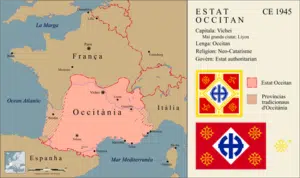Unless your ancestors are from the the south of France you might not have even known that Occitan was a language at all. But for a long time this language was a common tongue across a decent swath of Europe. How have you never heard of it?
Maybe you have heard of the The Troubadors, those traveling romantic musicians of the High Middle Ages who sang of courtly love, chivalry, and lust in palaces from England to Italy.
The language is quite romantic and poetic and earthy. And while not all speakers of Occitan were troubadours (or trobairitz if you were a woman) all troubadours were Occitanians. All the troubadours spoke Occitan natively. I recently read a book by the noted (and recently deceased) American poet W.S. Merwin – The Mays of Ventadorn – about his time living in the south of France in the 30’s to learn more about the land and culture and language that would have inspired the troubadours and therefore inspire his own poetry.
If you have any thoughts on chivalry or romantic love at all, if you think it is good or bad…you are being influenced by the Occitan understanding of the world as it pertained to love.
In 1539 King Francois I made a law that all laws and administration from that point forward would be in French. French had emerged as being a language of a rich traders and Francois wanted, naturally, for this prestige to extend. But Occitan continued to be the tongue of the home and the field and the local church and the traditional language of the people who knew the land.
French became a dominant language and then during the French Revolution there became an even stronger push to eliminate Occitan to solidify and homogenize the notion of French-ness and from that point forward in France until relatively recently Occitan was looked down upon, called a derivative dialect, a patois, and in Occitan ‘la verghona’ – a shame. Occitan was functionally banned in France until the 20th century but it persisted in old women making prayers to grape vines who swore that the fruit needed sun, water and prayers in Occitan to grow, old men longing for the visit of a particular bird and turns of phrases in the folk tales and proud late night recountings by greying embers of the troubadours. That little langue d’oc particular to that little corner of the world. It was almost as if the land itself spoke Occitan. Maybe it did.
I recount all this to you because Occitan is making a bit of a comeback in southern France. People are trying to re-learn the language of their ancestors and in so doing finding a bit of an old and overgrown trail, but still a trail, to some of the old ways of knowing in Dordogne.
We here like to hear about such things because we think we too are rememberers of older ways that are slower and local and connected to the land and resisters to homogenizing and monocultured forces.
So thank you for trying to keep such old ways close to you. So close to you that they go on your very skin. And if you need some more to help you remember you can just press the button below and pick some up.
Until soon,
M

